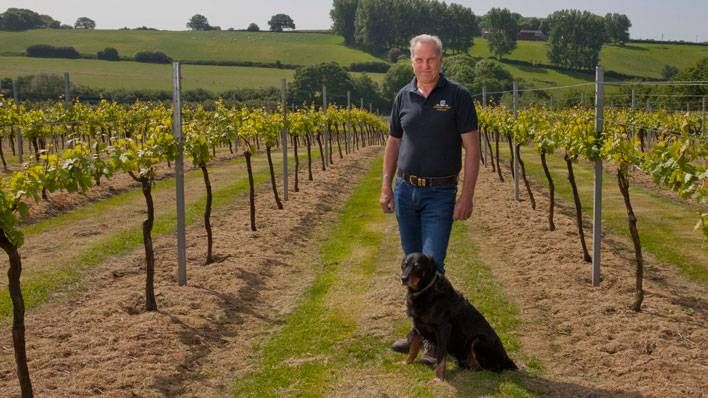
Best of British bubbly
As fans of British bubbly raise a glass to English Wine Week, winemaker Charles Palmer tells us how a 20-year partnership with Barclays has helped him grow his award-winning Sussex vineyard.
Winemaking is not for the impatient. From planting five acres of his Sussex farmland with vines to selling his first batch of vintage sparkling wine took Charles Palmer seven years.
That first vintage – planted in 2006, bottled in 2009 and sold in 2013 – went on to win a gold medal at the Sommelier Wine Awards in 2014, and Palmer hasn’t looked back since. “We got great reviews and knew we needed to expand,” he says. “Winemaking is such a long game. You always need to be looking forward to where you want to be in the future.”
It was Barclays that made expansion possible. Palmer has been with the bank since 1999, and was able to negotiate a business development loan to allow him to plant an additional 30 acres – help he describes as a “key factor” in his vineyard’s success.
Charles Palmer Vineyards now has 25,000 vines covering 35 acres of land near the medieval village of Winchelsea, and has gone on to win the National Trust Fine Farm Produce Awards, as well as a Platinum award at the Decanter World Wine Awards for their Blanc de Blancs 2014 .
The success of expansion has also led to Charles investing in on-site winemaking equipment, allowing the team to move from employing contractors to producing their wine in-house for the first time. The company has also taken on a new top-end distributor – Raeburn Wines – to help bring his award-winning wine to new markets.
“The business is notable because of the production methods that Charles uses,” says Agricultural Manager David Eiffert, who has worked with Palmer for 15 years.
“Whether that’s pruning thousands of vines by hand at the beginning of the year, removing many of the leaves in the summer to allow more light and air to reach the grapes, or harvesting the grapes by hand in October, he has a truly artisan approach to his craft.”
For Palmer, moving into wine has secured the future of the farm. “For us it’s been a great decision,” he says. “It’s come at a time when farming is in a depressed state. Because we are making and selling our own wine, we have much more control over the end price, as opposed to selling wheat or lamb when you are told what the price will be.”
He describes British vineyards as “on a roll”, largely because global warming has changed climatic conditions in the south of England.
“Climate wise, we are about where the Champagne region was 50 years ago, whereas that area of France now suffers from hotter summers and extremes of weather,” he says.
Palmer says that Brexit, too, has changed the outlook for Charles Palmer Vineyards – and others in the industry.
"We’ve had a bit of an issue with purchasing equipment – most of which is from France or other European countries. The pound being so weak has also led to some additional costs.”
It’s not all doom and gloom though, he continues: “In terms of sales, things are looking good. People have been getting a bit hysterical about the shops being emptied of their favourite French wines – which has meant there’s a growing awareness about English vineyards and wines like ours.”
The English wine industry is certainly having a moment. With a record 1.6 million vines being planted across England in 2018, a further two million set to be planted in 2019 and homegrown fizz becoming more popular than wines from Australia, the US and Germany, winemakers like Palmer have begun to set their sights on tackling something that has been harder for English vineyards to master: a good red.
Buoyed by the success of its exceptional sparkling white wines – and the English wine industry in general – the vineyard this year focused on making a first special edition batch of red wine.
“It’s a delicious Pinot Noir, made in the burgundy style,” says Palmer, “so watch this space”.
Charles on choosing bubbly
Go vintage: “For me, vintage wines are more interesting. Wine is sunlight in a glass and the amount of sunshine in a particular year will vary the flavour. When you buy vintage wine, you know you are buying something hand-crafted from that year.”
Shop around: “The famous names are fine if you have a preference for them but they tend to be a blend of grapes and years, so it will taste the same from one year to the next.”
Notice the grape: “There’s a definite distinction between ‘blanc de blanc’ (100% chardonnay) and blanc de noir (100% pinot noir or pinot meunier) and it won’t cost you any more to experiment. Some people say they don’t like champagne because it’s bitter, but it may be that they like a different grape.”
Look beyond Champagne: “Even within Champagne, you have grapes that taste very different. The Aube region to the south-west of central Champagne in France produces some really exciting wines, that tend to be softer in flavour.”